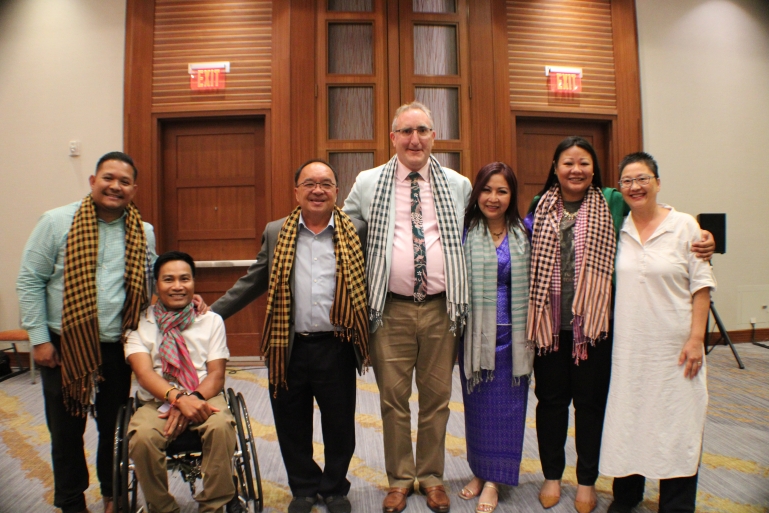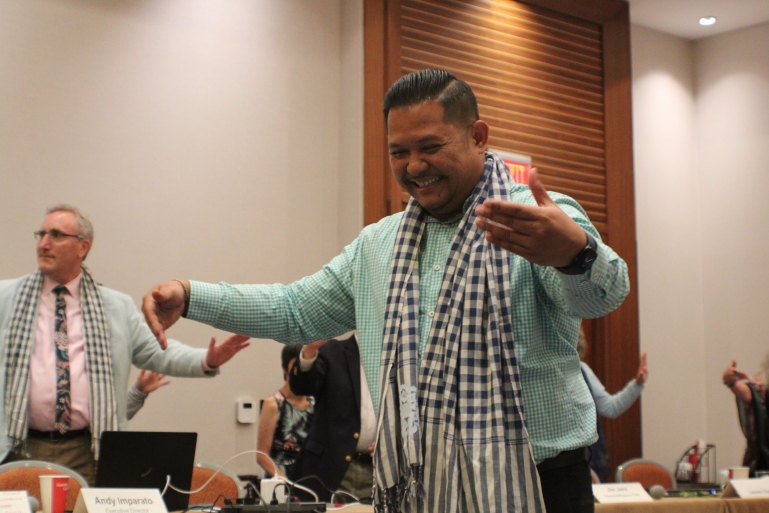Building Connections with the Cambodian Community

Building Connections with the Cambodian Community
Co-written by Rithy Hanh
Everyone deserves a safe place to call home, especially people coming to a new country as refugees. For a group of families from Cambodia, they were determined to make their corner of Stockton, California a place of belonging and support.
The dream for the families was to convert a neglected apartment complex into a safe space to gather, live, and ultimately thrive. The result of that dream is an apartment complex and community organization called APSARA, which is the last remaining affordable housing property collectively owned by Cambodian refugees in the United States.
Background
The majority of Cambodians that immigrated to the United States in the late 1970’s and early 1980’s are refugees of the 1975-1979 Cambodian Genocide that is more commonly known as the Killing Fields. The Killing Fields are a number of sites in Cambodia where collectively an estimated 2-3 million people or a quarter of the total population of Cambodians were killed and buried by the Khmer Rouge regime, the Communist Party of Kampuchea.
As refugees, they were not given the proper support to acculturate. A 2005 RAND study found that nearly two-thirds of adults suffered from post-traumatic stress disorder (PTSD), and more than half had major depression even 20 years after the Killings Fields. On top of that 70 percent said that since coming to the US, they have been exposed to violence, such as being a victim of robbery.
APSARA’s Founding
The city of Stockton has one of the largest populations of Cambodians living in the US because refugee resettlement programs identified Stockton as a city where a large Southeast Asian community would be able to settle successfully. In an ABC 10 news report, the Executive Director of San Joaquin County Historical Museum Phillip Merlo said, “some of that happened to be somewhat racist in modern reflection. There was reasoning that because a lot of the refugees were not well-educated, Stockton having a large working-class agriculture workforce would be a good place for them to come to.”
When the Cambodians arrived in Stockton, they ended up living in unsafe housing areas like the Park Village Apartments. In 1989, a white supremacist opened fire at a local elementary school, killing five students between the ages of 6 and 9-years-old. Four of the children were Cambodian.
In response to gun violence and economic hardship, a group of 35 Cambodian refugee families founded APSARA, Asian Pacific Self-Development and Residential Association, which has been an anchor in the Southeast Asian community in Stockton since 1989.
The families spent years collectively negotiating with the Department of Housing and Urban Development (HUD) to purchase the Park Village Apartments, which were in disrepair. In 1993 after years of negotiations, APSARA purchased the 230-unit apartment complex from HUD for $1 dollar.
APSARA—which also means ‘dancer’ in Khmer, the official language of Cambodia—is more than an apartment complex; it’s also a grassroots membership organization that offers housing and services ranging from early literacy to youth leadership, physical health, and senior wellness.
Disability Connection
Disability Rights California first became involved with APSARA because of Rithy Hanh, a senior advocate in the Pathways to Work Practice Group. Hanh is DRC’s first Khmer-speaking employee who can also read and write in Khmer, the language spoken by Cambodians.

– Rithy Hanh

Hanh was born in a refugee camp on the border of Cambodia and Thailand where he lived for 11 years. He said he hopes to build a relationship with APSARA and other Cambodian centered community based organizations across the state to provide the support they need to a disproportionately disabled population.
Hanh explained that disabilities are often stigmatized in Cambodian culture. Children with disabilities can be considered a sign of bad karma in the Buddhist faith—Cambodia is a majority Buddhist country—which can lead to shame and a lack of seeking services. There is also a lack of language for certain disabilities, for example, there is no word for “autism” in Khmer.
Generational Trauma
Because of the violence, starvation, and devastation Cambodian refugees faced during the Cambodian Genocide, trauma is a prevalent issue in the community. Trauma can manifest physically as nightmares, insomnia, panic attacks and headaches.
“Why does seeing a plate of rice make my mom cry,” asked APSARA Program Manager Sothea Ung. “Why can’t she sleep through the night.”
Ung explained that people who have experienced traumatic events like genocide can still feel those feelings intensely, as if they have just happened. He described the feeling like a “magnet” that pulls people backwards, so it feels, “like yesterday, not 40 years.”
Trauma can also negatively affect the next generation who did not experience the trauma directly, but who have been raised by people who carry trauma deep within them.

– Rithy Hanh

Without the adequate skills to cope, the next generation often turns to violence to feel safe. Gang participation in Cambodian youth is an issue that has personally impacted members of APSARA and is a problem they hope to tackle through their mission.
Going Forward
Hanh continues to embrace ways to connect the Cambodian and disability communities together, recently through inviting four members of the Cambodian community in Long Beach to share their experience at a DRC board meeting. The four speakers each had their own experience with disability: a self-advocate, someone advocating for their child, a physician, and a community advocate. The throughline that all the presenters shared was the need for culturally competent services, which understand the perspectives of the Cambodian community.


“I want to break that barrier,” Hanh said. “I want to go in there and just like make a difference…because if we can empower one family, that one family will continue to empower each other.”




